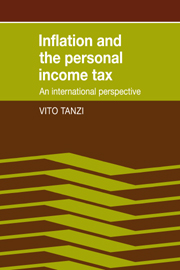Book contents
- Frontmatter
- Contents
- Preface
- 1 Inflation and personal income taxation: an introduction to the main issues
- 2 Inflation and the real progression of the rates: problems and solutions
- 3 Inflation and the real progression of the rates: countries' experiences
- 4 Inflation and the taxation of capital gains: problems and solutions
- 5 Inflation and the taxation of interest income: problems and solutions
- 6 Inflation and the taxation of business incomes
- 7 Inflation, lags in collection, and the real value of income tax revenue
- 8 Sensitivity of personal income tax yield to income changes: theory and measurement
- 9 Indexing the personal income tax for inflation and real growth
- 10 Inflation, income taxes, and the equilibrium rate of interest: theory
- 11 Inflation, income taxes, and interest rates: some empirical results
- 12 Inflation, indexation, and the wage-tax spiral
- 13 Some general conclusions on indexation
- Notes
- Index
3 - Inflation and the real progression of the rates: countries' experiences
Published online by Cambridge University Press: 07 October 2011
- Frontmatter
- Contents
- Preface
- 1 Inflation and personal income taxation: an introduction to the main issues
- 2 Inflation and the real progression of the rates: problems and solutions
- 3 Inflation and the real progression of the rates: countries' experiences
- 4 Inflation and the taxation of capital gains: problems and solutions
- 5 Inflation and the taxation of interest income: problems and solutions
- 6 Inflation and the taxation of business incomes
- 7 Inflation, lags in collection, and the real value of income tax revenue
- 8 Sensitivity of personal income tax yield to income changes: theory and measurement
- 9 Indexing the personal income tax for inflation and real growth
- 10 Inflation, income taxes, and the equilibrium rate of interest: theory
- 11 Inflation, income taxes, and interest rates: some empirical results
- 12 Inflation, indexation, and the wage-tax spiral
- 13 Some general conclusions on indexation
- Notes
- Index
Summary
In this chapter, I outline the practical experiences of several countries in trying to maintain a constant real progression of the rates through the indexation of exemptions and brackets. The countries are classified into four groups on the basis of the type of adjustment made. For the first group, the connection between the adjustment made and the rate of inflation is direct and complete, apart from discrepancies introduced by some of the special problems mentioned in Chapter 2. For the second group, the connection is still direct, but it is no longer complete. For the third group, the connection between inflation and the adjustment made is somewhat more tenuous, because substantial discretionary elements enter into the adjustment mechanisms. Finally, for the fourth group, although one can still talk about inflationary adjustments, and inflationary changes remain the most important factor, other elements enter the picture, so that one is hesitant to continue referring to these adjustments as indexation for inflation.
Countries with full, annual, automatic inflationary adjustments
The laws which describe the adjustment mechanisms are not always easy to interpret, but it appears that Canada, Australia, and Argentina are the only countries that qualify for this category. Up to 1974, Uruguay also belonged to this group. In these countries, the exemptions and deductions in fixed amounts, as well as the brackets, are fully, annually, and automatically increased to reflect changes in the consumer price index.
- Type
- Chapter
- Information
- Inflation and the Personal Income TaxAn International Perspective, pp. 23 - 40Publisher: Cambridge University PressPrint publication year: 1980



